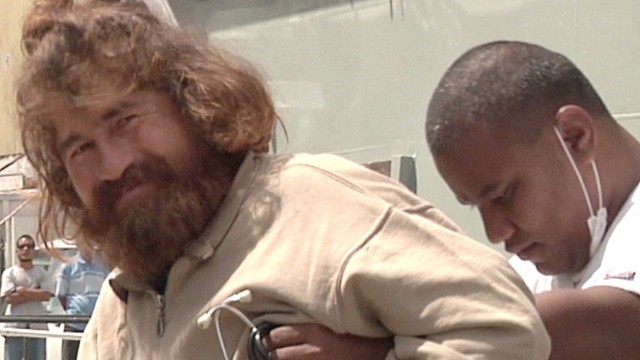Castaway claims he drifted 13 months in Pacific
February 4, 2014 -- Updated 0007 GMT (0807 HKT)

Fisherman adrift at sea for 13 months
The man calling himself
Jose Salvador Alvarenga turned up in a heavily damaged boat on a remote
coral atoll in the Marshall Islands, claiming that he had been living
off fish and turtles he had caught and relying on rainwater, and
sometimes his own urine, to drink.
Authorities are trying to
determine the veracity of Alvarenga's story. The Mexican government
issued a statement Monday confirming Alvarenga's identity and saying he
was an El Salvador national who was living in Tonala in Chiapas state.
Alvarenga is from Garita
Palmera in El Salvador, where CNN caught up with some members of his
family. They hadn't heard from him in ages and thought he might be dead.
He has a 12-year-old daughter there who doesn't remember her father.
"My heart would tell me
that my son was not dead, but I wondered about it so often that I had
started to lose faith," said Julia Alvarenga, his mother.
"God willing, my son is
not dead. God willing, my son is alive. And we're going to see him again
one day. I'm very happy after learning that he's alive and that we will
have him back home soon," his father, Ricardo, said.
Alvarenga was
found on sparsely populated Ebon Atoll, a 22-hour boat ride from the
Marshall Islands capital of Majuro, on Thursday. The southernmost of the
Marshall Islands' atolls, Ebon has only 2.2 square miles of land, one
phone line and no Internet service. The government airplane that
services the atoll was not working, so Alvarenga did not make it to
Majuro until Monday morning.
Video from Majuro shows
Alvarenga walking a gangplank from a government boat to a waiting
ambulance. Waving to those gathered around the dock, he is supported by a
medical assistant as he walks. From inside the ambulance, he gives a
thumbs up before it drives away.
Alvarenga, who says he is
37, is now in a local hospital recovering from his ordeal, said Tom
Armbruster, U.S. ambassador to the Marshall Islands.
"He's in much better shape than one would expect after such an ordeal," Armbruster said.
In a hospital-bed interview with The Telegraph of London, Alvarenga told of how he hit land.
"I had just killed a bird to eat and saw some trees," he is quoted as saying.
"I cried, 'Oh, God.' I
got to land and had a mountain of sleep. In the morning, I woke up and
heard a rooster and saw chickens and saw a small house. I saw two native
women screaming and yelling. I didn't have any clothes; I was only in
my underwear, and they were ripped and torn," The Telegraph quotes
Alvarenga as saying.
People on the island
where he was found Thursday say the 26-foot fiberglass boat was in very
bad condition, covered in barnacles and with the carcasses of several
turtles littering the deck.
Alvarenga is said to
have set off from the Mexican town of Costa Azul, according to Reynaldo
Aguilar Martinez, undersecretary for the state of Chiapas. He claims to
have left for what was supposed to be a one-day expedition to catch
sharks on December 21, 2012.
Alvarenga said that he
and a teenage companion were blown off-course by northerly winds and
then caught in a storm, eventually losing use of their engines.
According to Anjenette
Kattil of the Marshall Islands Ministry of Foreign Affairs, Alvarenga
said that four weeks into their drift, he lost the young man because he
refused to eat raw birds. There are no details on what Alvarenga did
with the young man's body.
Alvarenga told the Telegraph his companion's death had him contemplating suicide.
"For four days, I wanted
to kill myself. But I couldn't feel the desire; I didn't want to feel
the pain. I couldn't do it," he is quoted as saying.
Kattil said Alvarenga
worked for a company named Camaroneras de la Costa in Mexico. He has
told authorities that he is a citizen of El Salvador but has lived in
Mexico for the past 15 years and wishes to be repatriated back to
Mexico.
Armbruster, the U.S.
ambassador, said Alvarenga indicated that he had relatives living the
United States and U.S. officials would attempt to locate them.
Government officials
have been in contact with Mexico's ambassador to the Marshall Islands,
who is based in the Philippines, concerning Alvarenga in hopes he can
contact El Salvadoran authorities.
The Mexican Ministry of
Foreign Affairs issued a statement saying it has sent personnel from its
embassy in the Philippines "to learn directly about the case."
If Alvarenga's story
proves true, the trip across the Pacific would have taken him across
roughly 6,700 miles (10,800 kilometers) of open ocean before ending in
the Marshall Islands, about halfway between Hawaii and Australia, in the
northern Pacific.
Such an amazing journey
isn't unheard-of in the small Pacific nation, as three Mexican fishermen
made a similar drift voyage in 2006 that lasted nine months. Those men
lived off fish they caught and rainwater, and they read the Bible for
comfort.
Conditions in the
Pacific make the timeline of Alvarenga's journey plausible, according to
Judson Jones, a producer for CNN Weather.
Jones said the currents
between Mexico and the Marshall Islands would have carried a boat about
27 miles (42 kilometers) a day. That would mean the journey would take
about 208 days if the boat stayed in the current. But Jones said a
meandering journey in and out of the currents was most likely, making a
13-month journey believable.
CNN's Rafael Romo, Gustavo Valdes, Nick Parker and journalist Jack Niederthal contributed to this report.

ไม่มีความคิดเห็น:
แสดงความคิดเห็น